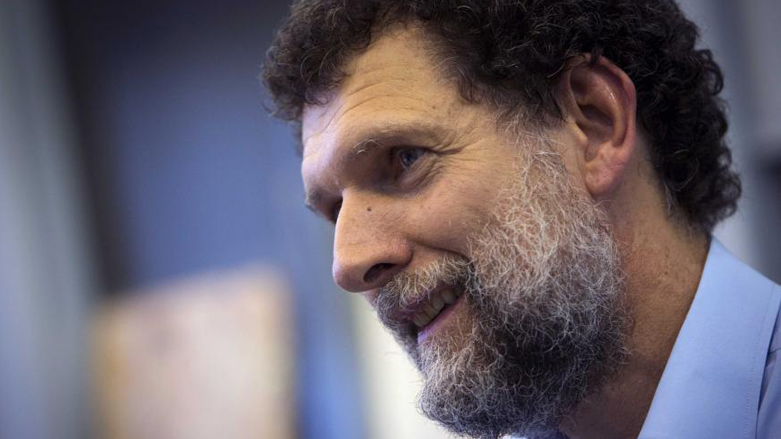US and Europe condemn life sentence for Osman Kavala; call for his release

WASHINGTON DC, United States (Kurdistan24) – The US and Europe strongly criticized the harsh sentence handed down to Osman Kavala on Monday, urging Turkish authorities to free him.
Kavala, a businessman, philanthropist, and civic activist, was first arrested in the fall of 2017 on charges that he had financed protests in Turkey in 2013. He was subsequently held without trial for over four years.
On Monday, a three-man Turkish court sentenced him to life in prison without parole. Seven other defendants were said to have been involved in the supposed conspiracy led by Kavala, and were sentenced to 18 years in prison.
Experts explain the harsh sentence, in part, by referring to Turkish President Recep Tayyip Erdogan's peculiar obsession with him. Erdogan has claimed that Kavala is an agent of the Hungarian-born American financier, George Soros, head of the Open Society Foundation, which supports democratic enterprises in over 100 countries.
Kavala was on the board of the Turkish branch of the Open Society Foundation. Soros is Jewish and “is frequently accused of being a mastermind of international conspiracies,” the US business magazine, Forbes, reported in 2020. What explains such animosity? “Anti-semitism, plain and simple,” Forbes said.
US and European Criticisms
“The United States is deeply troubled and disappointed” by the Turkish decision “to convict Osman Kavala today,” State Department Spokesperson Ned Price said in a written statement on Monday.
“His unjust conviction is inconsistent with respect for human rights, fundamental freedoms, and the rule of law,” he continued.
“We call again on Turkey to release” him, Price stated, “as well as to free all others arbitrarily incarcerated.”
Already in 2019, two years after his arrest, the European Court of Human Rights condemned the charges against Kavala and called for his release.
The Turkish indictment of Kavala was based on tapped telephone calls, in which he discussed sending milk, pastries, juice, and gas masks to the protestors. Turkish authorities claimed this showed he was financing the protests—and that it constituted an illegal effort to overthrow the government.
However, the European Court of Human Rights concluded otherwise. “In the absence of facts, information, or evidence, showing that Mr. Kavala had been involved in criminal activity,” it affirmed, “he could not reasonably be suspected of having attempted to overthrow the Government by force or violence.”
The European Court called for Kavala’s immediate release, and several months later, in February 2020, he was, in fact, acquitted.
But before he could be released, Kavala was charged with being a co-conspirator in the attempted coup of 2016, which Ankara has blamed on Fethullah Gulen and his followers. Subsequently. Kavala’s acquittal on the first charges was overturned, and the two sets of charges were fused together.
On Monday, the European Union’s top diplomat, Josep Borrell, stated that Turkey’s “life sentence for Osman Kavala together with heavy prison sentences for other defendants show maximum harshness.”
“They ignore the decision of the European Court for Human Rights,” Borrell affirmed. “Respecting fundamental rights and freedoms is today more important than ever.”
Germany’s Foreign Minister called for Kavala’s “immediate release,” denouncing the sentence as “blatantly in contradiction with the norms of the rule of law and international obligations Turkey has signed up to as a member of the Council of Europe and EU membership candidate.”
Sentencing on Same Day UN Secretary-General Visits Ankara on way to Moscow
The harsh Turkish sentencing of Kavala and his co-defendants came on the same day that UN Secretary-General Antonio Guterres stopped over in Ankara to meet with Turkish President Recep Tayyip Erdogan before traveling on to Moscow.
Guterres meets with Russian President Vladimir Putin on Tuesday in an effort to resolve the crisis with Ukraine. Erdogan enjoys relatively friendly relations with both Moscow and Kyiv, and Guterres sought to learn from Erdogan’s efforts to mediate between the two.
In their meeting, Guterres “expressed his support for Turkey’s ongoing diplomatic efforts in relation to the war in Ukraine,” according to the UN readout of his meeting with Erdogan.
They “reaffirmed that their common objective is to end the war as soon as possible and to create conditions to end the suffering of civilians, and agreed to stay in contact to follow up on ongoing initiatives.”
Guterres’ trip has come under sharp criticism, however. Ukrainian President Volodymyr Zelensky complained that Guterres should have visited Kyiv before going to Moscow. He indicated that by passing over Kyiv, Guterres will have little idea of what Russian forces have done in Ukraine, including the atrocities they have committed.
British Prime Minister Boris Johnson expressed a similar view. Johnson spoke with Guterres on Sunday evening and cautioned him to be “careful,” as “Putin will seek to manipulate his visit,” The Daily Telegraph reported.
Indeed, Guterres's visit to Moscow “risks worsening relations between NATO leaders and the UN,” the Telegraph said. “The alliance has been frustrated at the UN’s lack of action on Russia.”
